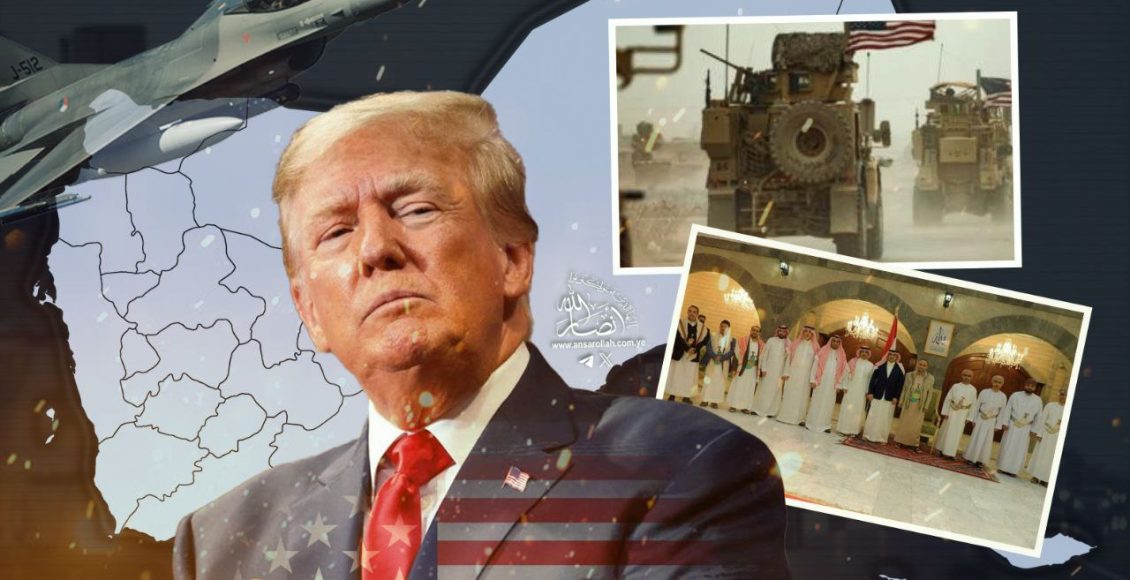The United States has intensified its efforts to halt the Yemeni support for Gaza and military operations in the Red Sea. Yemen’s strategic actions have disrupted Israeli, American, and British navigation in the region, forcing them to reroute shipping through the Cape of Good Hope, incurring significant economic and strategic losses to the Axis of Evil.
Despite their alliances and military coalitions, such as the U.S.-UK “Sentinel” coalition and the European “Aspid” coalition, American and European forces have failed to curb Yemen’s resilience. Yemen continues to maintain its sacred and humanitarian mission of supporting Gaza, engaging in direct confrontations with U.S., British, and European warships multiple times. These confrontations have led to the retreat of three U.S. aircraft carriers and several British, French, and German warships from the Red Sea over the past year.
Economic Measures in Response to Red Sea Losses
In light of these failures, the United States is searching for new strategies to secure Israeli navigation in the Red Sea and Bab al-Mandab strait. Upon those strategies is what U.S. Envoy to Yemen "Tim Lenderking" proposed, Washington's effort to "obtain global support to grant the United Nations enhanced powers to intercept ships heading to Yemeni ports controlled by the Houthis, a measure in effort to weaken the group", according to the British "Guardian."
Lenderking’s comments came after a recent visit to Djibouti, where he met with the UN Verification and Inspection Mechanism (UNVIM). Which signaled a form of escalation that could involve reinstating the restrictions previously imposed on the arrival of ships to Hudaydah port—restrictions that had been eased with the beginning of de-escalation efforts between Riyadh and Sana’a in 2022."
Lenderking clarified that “UN forces are neither equipped nor authorized to carry out interception operations.” To address what he called “gaps, he stated that the situation “requires a different mindset and a different focus rather than merely escorting ships.” He further pointed out that Washington seeks to make “the mission’s mandate more effective in preventing the Houthis from obtaining weapons,” as he described.
In the same context pursued by Lenderking, the matter aligns with the perspective of the U.S. Fifth Fleet’s commander, "Daryl Caudle", who stated: “The key to maintaining the security of Bab al-Mandab, the Gulf of Aden, and the Red Sea is preventing the flow of missiles and weapons into Yemen.” This prevention differs from Lenderking’s approach, as it takes on a maritime military nature, focusing on monitoring and halting alleged shipments from Iran. Caudle added, “French and British navies will also be operating in those waters soon.”
By combining the statements of Lenderking and Caudle, the resulting option would involve supporting the UN inspection mechanism with a U.S.-UK-French maritime mission under a modified UN mandate, as hinted at by "Caudle". However, such an initiative would require a Security Council resolution, which Lenderking described as “global support for granting the United Nations clearer powers to intercept ships."
Military Options
While diplomatic and economic measures are being considered, military escalation remains possible. However, the condition of U.S. naval forces remains unwell, Caudle acknowledged challenges facing the U.S. Navy, including extensive maintenance delays for several warships, with some requiring between four to five months for maintenance, with other ships having surpassed their operational lifespan undergoing repairs. Admiral Caudle emphasized the phrase, 'Be realistic, be better,' which reflects the fragile state of the U.S. Navy, especially after three aircraft carriers—"USS Eisenhower", "USS Roosevelt", and "USS Abraham Lincoln"—retreated from Yemeni strikes. Now, the fourth, "USS Harry Truman" has arrived in the region.
Speaking of the USS Harry Truman, its arrival has sparked speculation and conjecture about a potential U.S. military escalation against Yemen. However, this remains confined to the wishes of certain Yemeni mercenaries, and is not certain, especially given that these speculations quickly revert to expressions of despair, placing blame on members of what is called the Presidential Council, which is unable to convene in Aden, but continues to meet in Riyadh.
In their most recent meeting, all members of the weakened council were present in Riyadh for discussions with the ambassadors of the quadruple coalition against Yemen, alongside the French ambassador. According to Saudi media, the council’s commitment to " achieving political, economic, and security priorities" was emphasized. "Okaz" newspaper reported that " the ambassadors welcomed the council’s vision" for economic reforms, stability, and improving living conditions for the Yemeni people. They reaffirmed their unwavering support for the "Presidential Council," the "Yemeni government," and its institutions to deliver essential services, strengthen governance, and support the country’s economic development.
It is noteworthy that this meeting took place amid a severe decline in services, with the council authorities struggling to generate revenue, leading to an inability to pay salaries for the past two months. This has resulted in popular dissatisfaction, rising tensions, and calls for a general strike in Aden and occupied governorates.
Sana’a’s Preparedness and Strategic Vision
In Sana’a, Yemeni leadership remains resolute. Sayyid Abdul-Malik al-Houthi emphasized ongoing readiness and vigilance against potential betrayals. Military drills continue, with a clear message to Riyadh: confidence in victory remains unshaken and any deviation from the current de-escalation agreements will result in significant shifts in Yemen’s favor.
Sana’a has repeatedly urged Riyadh to prioritize mutual interests and resist U.S. provocations, drawing lessons from nearly ten years nearing completion.







